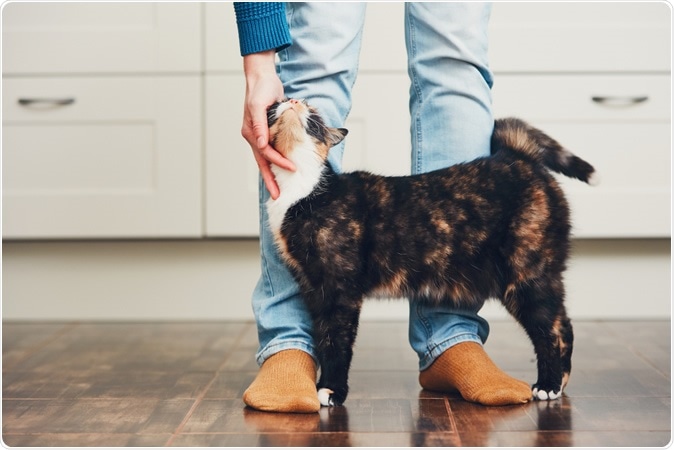A recent paper from Spanish researchers at the Hospital Universitario San Pedro-CIBIR, available on the medRxiv* preprint server, suggests that cats may act as asymptomatic dispersers of severe acute respiratory syndrome coronavirus 2 (SARS-CoV-2), even though viral transmission from animals to humans still seems highly unlikely.
The natural origin of SARS-CoV-2, which is responsible for the ongoing and disruptive pandemic of coronavirus disease 2019 (COVID-19), is likely due to spillover events from bats that occurred in late 2019.
Pangolins, stray dogs, turtles, snakes, yaks, and even hamsters have been considered as potential intermediate hosts before the virus successfully spread to humans; however, this is still a matter of intense scientific debate.

The role of cats and dogs in COVID-19 pandemic
According to the World Health Organization (WHO), as of May 2020, there is no evidence that either dogs or cats can disseminate SARS-CoV-2 and hence act as a source of human infection. Consequently, there is no valid reason to remove pets from homes with COVID-19-positive household members.
Nevertheless, any new or emerging disease comes with certain 'knowledge gaps' in our understanding of its epidemiology. Therefore, it is always relevant and somewhat necessary to assess the potential of domestic transmission through pets adequately.
After tracing coronavirus signatures in different species, one recent study published in the journal Molecular Biology and Evolution even suggested that stray dogs may have acted as the origin of the COVID-19 pandemic.
This is why researchers from the Center of Rickettsiosis and Arthropod-Borne Diseases at the Hospital Universitario San Pedro-CIBIR in Logroño, Spain, decided to evaluate the potential role of SARS-CoV-2 transmission from companion animals (particularly dogs and cats) in La Rioja (northern Spain) during the early stages of the pandemic.
A game of cat and coronavirus
Between April and May 2020, a total of 23 asymptomatic and quarantined mammalian pets (12 dogs, 8 cats, 2 rabbits, and 1 guinea pig) from 17 households with confirmed human COVID-19 infection (diagnosed at the Hospital Universitario San Pedro in Logroño, Spain) were included in the study.
In this bunch, only one cat without any clinical symptoms tested positive for SARS-CoV-2. More specifically, this was an 8-year-old female European domestic cat without clinical signs related to coronavirus disease, albeit with a plethora of prior diseases such as chronic feline gingivostomatitis, idiopathic cystitis, chronic kidney disease, and feline asthmatic bronchitis.
The virus was detected in an oropharyngeal swab by employing three RT-qPCR assays, which is a highly sensitive test for detecting SARS-CoV-2 genetic material. Additional rectal swab specimens did not reveal any viral RNA.
The owner suffered from severe pneumonia due to COVID-19 and was hospitalized for eight days, while the other cat from the same household tested negative for SARS-CoV-2. The virus has not been detected in the remaining animals that were tested.
"Our study reports for the first time the detection of an asymptomatic cat with SARS-CoV-2 in Spain, probably associated with close contact with its owner who was diagnosed with active COVID-19 infection", study authors summarize their findings.
What does this mean for pet owners?
Based on study results, it is likely that the number of affected cats living with owners positive for COVID-19 is higher than scientific literature shows, since these animals may be asymptomatic and, therefore, not detected.
"Our finding suggests that cats may act as asymptomatic dispersers of the virus, although the transmission of SARS-CoV-2 from animals to humans seems unlikely", state study authors in their medRxiv paper.
"All cases seem to be related to human transmission through symptomatic or asymptomatic COVID-19 infected people taking care of the animals", they add.
Thus far, all positive findings in pets were actually 'isolated cases' that emerged due to close contact with humans positive for SARS-CoV-2. A similar occurrence was already described during the original SARS outbreak in 2002-2003, but the infected domestic animals were considered dead-end hosts sans any epidemiological significance.
In any case, standard hygiene measures should be diligently exercised when living with a pet, especially in cases of infection with the novel coronavirus. Moreover, the US Centers for Disease Control and Prevention (CDC) currently recommends restricting contact of people infected with COVID-19 with their companion animals.
At the same time, the World Organization for Animal Health (OIE) highly recommends keeping all positive animals isolated from other unexposed ones. Further research on this issue is definitely warranted in order to develop steadfast guidelines and appropriate public health measures.
*Important Notice
medRxiv publishes preliminary scientific reports that are not peer-reviewed and, therefore, should not be regarded as conclusive, guide clinical practice/health-related behavior, or treated as established information.
- Ruiz-Arrondo, I. et al. (2020). Detection of SARS-CoV-2 in pets living with COVID-19 owners diagnosed during the COVID-19 lockdown in Spain: A case of an asymptomatic cat with SARS-CoV-2 in Europe. medRxiv. https://doi.org/10.1101/2020.05.14.20101444.
https://news.google.com/__i/rss/rd/articles/CBMia2h0dHBzOi8vd3d3Lm5ld3MtbWVkaWNhbC5uZXQvbmV3cy8yMDIwMDUyNC9TdHVkeS1zaG93cy1jYXRzLWNhbi1oYXJib3ItU0FSUy1Db1YtMi13aXRob3V0LWFueS1zeW1wdG9tcy5hc3B40gFvaHR0cHM6Ly93d3cubmV3cy1tZWRpY2FsLm5ldC9hbXAvbmV3cy8yMDIwMDUyNC9TdHVkeS1zaG93cy1jYXRzLWNhbi1oYXJib3ItU0FSUy1Db1YtMi13aXRob3V0LWFueS1zeW1wdG9tcy5hc3B4?oc=5
2020-05-24 23:59:00Z
52780805032652
Bagikan Berita Ini














0 Response to "Study shows cats can harbor SARS-CoV-2 without any symptoms - News-Medical.net"
Post a Comment